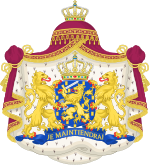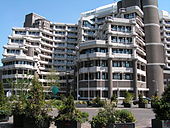Ministry of Foreign Affairs (Netherlands)
This article needs additional citations for verification. (March 2015) |
| Ministerie van Buitenlandse Zaken | |
 Coat of arms of the Netherlands | |
 Ministry of Foreign Affairs | |
| Department overview | |
|---|---|
| Formed | March 12, 1798 |
| Jurisdiction | Kingdom of the Netherlands |
| Headquarters | Bezuidenhoutseweg 67, The Hague, Netherlands |
| Annual budget | €11,5 billion (2013)[1] |
| Ministers responsible |
|
| Website | Ministry of Foreign Affairs |
The Ministry of Foreign Affairs (Dutch: Ministerie van Buitenlandse Zaken; BuZa) is the Dutch Ministry responsible for foreign relations, diplomacy, European cooperation and international development. Though the Dutch Republic had extensive international relations and diplomatic activity, the present Ministry was created in 1798 as the Department of Foreign Affairs of the then Batavian Republic and in 1876 became the Ministry of Foreign Affairs. The Ministry is headed by the Minister of Foreign Affairs, currently Bert Koenders.
| Part of the Politics series |
![Azure, billetty Or a lion with a coronet Or armed and langued Gules holding in his dexter paw a sword Argent hilted Or and in the sinister paw seven arrows Argent pointed and bound together Or. [The seven arrows stand for the seven provinces of the Union of Utrecht.] The shield is crowned with the (Dutch) royal crown and supported by two lions Or armed and langued gules. They stand on a scroll Azure with the text (Or) "Je Maintiendrai" (French for "I will maintain".)](http://upload.wikimedia.org/wikipedia/commons/thumb/8/8f/State_coat_of_arms_of_the_Netherlands.svg/150px-State_coat_of_arms_of_the_Netherlands.svg.png) |
|---|
|
|
Responsibilities
The Ministry is responsible for the foreign policy of the Kingdom of the Netherlands. It has eight goals:
- To strengthen the international legal order and respect for human rights.
- To promote security and stability, effective humanitarian assistance, and good governance.
- To strengthen European cooperation.
- To increase wealth worldwide and fight poverty.
- To promote human and social development.
- To protect and improve the environment.
- To promote the welfare and safety of Dutch nationals abroad and to regulate the movement of persons
- To raise the Netherlands' cultural profile and help create a positive image within and beyond the Netherlands
Organisation
The ministry consists of the political leadership the two ministers and the state secretary, civil service in the Hague, the diplomatic missions and various independent agencies.
Ministry
The civil service consists of the top level, the secretary general and his deputy and five directorates general, which manage several departements. The directorates general are led by Directors-General and are occupied with specific issues of foreign policy.
- The Directorate-General for European Cooperation concerns itself with the European Union. It is responsible for Dutch relations with EU members and candidate countries. It also coordinates policy in other regional organizations like the Council of Europe, the OECD and the Benelux
- The Directorate-General for Political Affairs is concerned with peace, security matters and human rights. This includes the EU's Common Foreign and Security Policy and the political role of NATO and the United Nations.
- The Directorate-General for International Cooperation is responsible for international development, including economic development, education, health and environment. It implements Dutch development policy within the United Nations and the World Bank and has strong contacts with non-governmental organizations like NOVIB.
- The Directorate-General for Regional Policy and Consular Affairs coordinates the diplomatic missions. It also shapes the migration and cultural policies of the ministry.
Missions
The Netherlands has more than 150 missions. These missions promote the interest of the Kingdom of the Netherlands. They include:
- 110 embassies
- 27 consulates-general
- 15 permanent representations at international organizations, such as the UN, the EU and NATO.
- one embassy office (in Pristina)
- two representations: one to the Palestinian Authority in Ramallah and another in Afghanistan.
Independent agencies
The ministry has several different independent agencies:
- Advisory Council on International Affairs, which adivises the ministry on foreign affairs.
- Advisory Committee on Issues of Public International Law, which advises with international public law.
- Netherlands Development Assistance Research Council, which advises the ministry on international development.
- Government Committee on Private International Law, which advises with international private law.
- Centre for the Promotion of Imports from Developing Countries aids developing countries in selling their products and services in the European Union.
- National Committee for International Cooperation and Sustainable Development, manages the funds for international development that are spent by civil society.
History
The Ministry was formed in 1798 as the Department of Foreign Affairs . Since 1965 a minister for international development has been appointed each formation (excluding in the First Balkenende cabinet and the First Rutte cabinet) and since 1956 there was a State Secretary for European Affairs.
List of Ministers of Foreign Affairs
For a list of the Ministers of Foreign Affairs of the Netherlands, see List of Ministers of Foreign Affairs of the Netherlands.
Since the 1990s there have been three political leaders of the ministry of foreign affairs: the minister (called M), the minister without portfolio for international development (called R) and the state secretary for European affairs (called T). The state secretary of European Affairs has the right to call himself Minister of European Affairs outside of the Netherlands.
See also
References
- ^ Template:Nl V Buitenlandse Zaken, Rijksoverheid, September 18, 2012
External links
- Template:Nl Ministerie van Buitenlandse Zaken (Rijksoverheid)

